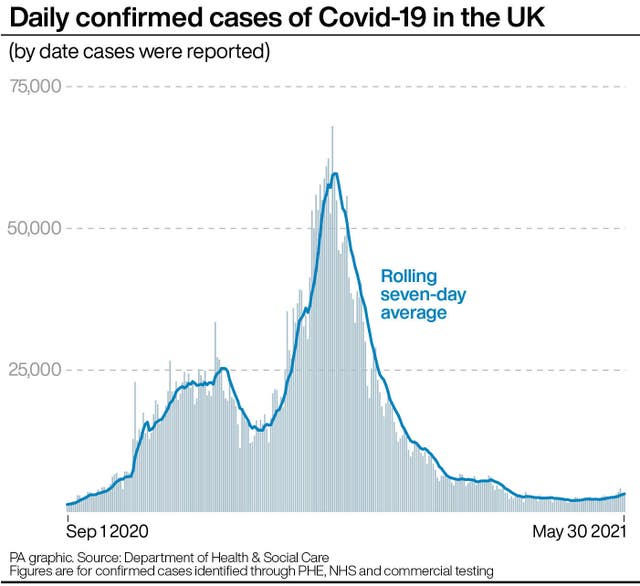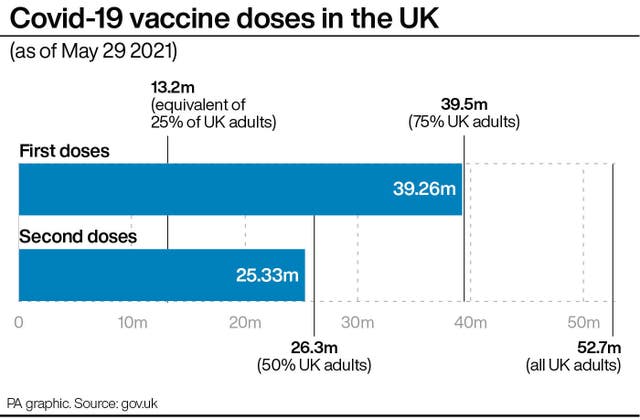The vaccination programme is set for “another big week” as ministers weigh up whether – and to what extent – England’s coronavirus restrictions can be lifted on June 21.
All over-50s are set to have had both doses by that date under a target set out by vaccines minister Nadhim Zahawi, although it takes time for the full protection to kick in.
The continued spread of the Indian coronavirus variant has cast doubt on the ability to scrap restrictions, with ministers considering plans to keep some measures – such as the continued use of face masks and guidance on working from home – in place.
But proposals for domestic vaccine passports are reported to have been shelved.
More than 25 million people have now received both doses of a vaccine and Mr Zahawi said: “Together we will beat Covid. The team is focused on another big week ahead.”
The Government will wait until June 14 to assess the latest data before deciding whether to proceed with lifting England’s remaining restrictions the following week.
The vaccine programme is one of the key factors in the decision and Mr Zahawi told Times Radio “I could do with more supply” because “I will be able to protect more people more rapidly”.
Asked whether the remaining restrictions could be eased if cases were still increasing, he told BBC1’s Andrew Marr Show: “What I’m saying to you is we have to be cautious. We have to look at the data and share it with the country.
“Are we still vaccinating at scale? Big tick. Are the vaccines working? Yes.
“But are infection rates too high for us to then not be able to proceed because there are too many people getting into hospital? I don’t know the answer to it.”
Cabinet Office minister Michael Gove, who has been leading a review of vaccine passports – official termed Covid status certification as they would also include details of tests or natural immunity, has already indicated they might not be introduced on June 21, if at all.
The Daily Telegraph reported that plans to make them a legal requirement for large events are set to be dropped.
“It’s not a case of ‘it’s finely balanced’. It’s not going to happen,” a Government source told the newspaper. “Everyone says it’s dead.”
Great work vaccinating yesterday! Credit to the teams up and down the Country. Together we will beat Covid. The team is focused on another big week ahead! When you get the txt get the jab. @NHSuk 💉💉💉🇬🇧🇬🇧🇬🇧 https://t.co/ZNhOMslh3w
— Nadhim Zahawi (@nadhimzahawi) May 30, 2021
Giving evidence to MPs last week, Mr Gove said the potential benefits had to be weighed against the “cost and the hassle factor” and there was not an “ironclad” link between certificates and step four of the road map, which could be on June 21.
He also said the similar scheme in Israel which was being studied by UK ministers and officials had been dropped because the vaccination campaign meant it had “served its purpose”.
With vaccinations increasing in the UK – within days it is expected that three-quarters of all adults will have received a first dose – the case for a domestic passport scheme may be growing weaker.
A Government spokesman said: “The Covid status certification review is ongoing and no final decisions have been taken yet.”
The review had been due to finish by the end of the month but was delayed by the Indian variant.
Mr Gove will update MPs after they return from recess next week.

The latest official figures showed:
– A further six people have died within 28 days of testing positive for Covid-19 as of Sunday, bringing the UK total by that measure to 127,781.
– Between May 24 and 30 there were 60 deaths reported within 28 days of a positive coronavirus test, an increase of 42.9% compared to the previous seven days.
– As of 9am on Sunday, there had been a further 3,240 lab-confirmed cases in the UK.
– The number of cases between May 24 and May 30 – 22,474 – was 26.8% higher than the previous seven days.
– Some 39,259,168 people had received a first dose by Saturday – up 190,822 on the day before – while 25,332,851 of them had been given both shots, an increase of 440,435.
Experts have warned against “charging ahead” with lifting lockdown on June 21.

NHS Providers chief executive Chris Hopson warned that although hospitals were not expecting to be overwhelmed by a surge of Covid-19 cases, they were already stretched by going “full pelt” on dealing with the backlog of cases built up during the pandemic and urgent care needs.
Hospitals in tourist hotspots were also concerned about a rise in demand, with international travel restrictions meaning more holidaymakers flocking to British resorts.
“(The) current degree of pressure on hospitals is worrying especially since we saw clear summer demand surges in the two years before Covid-19,” he said.
“But if… success of (the) vaccination campaign means much lower levels of hospitalisation, serious illness and mortality, even with (the) new variant, that is very significant and important.
“This means there is a difficult decision to make for June 21.”
24/25 …But if, as evidence above suggests, success of vaccination campaign means much lower levels of hospitalisation, serious illness and mortality, even with new variant, that is very significant and important. This means there is a difficult decision to make for June 21.
— Chris Hopson (@ChrisCEOHopson) May 30, 2021
Linda Bauld, professor of public health at the University of Edinburgh, has said June 21 is “too early” to lift coronavirus restrictions in England.
She told Sky News: “I really think that it is too early to be charging ahead. I would like to see several more weeks’ data.”
Dr Mike Tildesley, a member of the Scientific Pandemic Influenza Group on Modelling (Spi-M) Government advisory panel, said there was still “quite a lot of uncertainty” around the June 21 date.
He told LBC: “We are starting to see signs of course that cases are going up, but at the moment we’re still obviously reporting hospital admissions and deaths at very low levels.”




Comments: Our rules
We want our comments to be a lively and valuable part of our community - a place where readers can debate and engage with the most important local issues. The ability to comment on our stories is a privilege, not a right, however, and that privilege may be withdrawn if it is abused or misused.
Please report any comments that break our rules.
Read the rules here